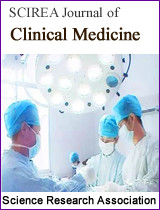The influence of the pathogenesis of maxillary sinusitis on the distribution of glucoconjugates in the Schneider membrane.
DOI: 262 Downloads 16684 Views
Author(s)
Abstract
We assume that the nature of the pathological changes in the mucous membrane of the maxillary sinus should also depend on the nature of the stomatology procedures that were carried out before the development of maxillary sinusitis. The literature suggests that changes in the composition of glycoconjugates correlate with the transformation of chronic maxillary sinusitis, with hyperplasia of the sinus mucosa and hypersecretion. Thus, changes in the microenvironment and in local inflammatory reactions in sinusitis can affect the carbon fragments of the cell surface. The aim: to study the pathogenetic bases of differentiation of maxillary sinusitis, which develop on the background of dental manipulations. Material and metods Sampling of biomaterial, a portion of the mucous membrane of the maxillary sinus was performed with 129 (100.0 %) patients, which were distributed according to etio-pathogenetic groups of stomatological maxillary sinusitis. Into the group of odontogenic form of stomatogenic maxillary sinusitis (OMS) there were 14 (10.9 %) patients who had inflammation in the sinus developed from previously untreated teeth. Into the group of infectious-allergic form of iatrogenic maxillary sinusitis (IAFIMS) there were 22 (19.1 %) patients who had established a periapical infection of previously treated teeth in the sinus in the etiology of the disease; The group of the mixed form of iatrogenic maxillary sinusitis (MixFINS) included 24 (20.9 %) patients with a filling material or a fragment of the tooth root in the lumen of the sinus. 12 (10.4 %) patients (who iatrogenic maxillary sinusitis of stomatologic origin which of chronic used medication hormones, antibiotics, drugs) were included in the medical form group (MFIMS). In the group of traumatic form of iatrogenic maxillary sinusitis (TFIMS) there were 57 (49.6%) patients with sinusitis which developed against surgical manipulations in the area of the alveolar process or the body of the upper jaw.
Keywords
lectinhistochemistry of the Schneider membrane, iatrogenic maxillary sinusitis, carbohydrate metabolism.
Cite this paper
Gulyuk A.G, Grigorieva E.А., Varzhapetian S.D., Stroganova T.V.,
The influence of the pathogenesis of maxillary sinusitis on the distribution of glucoconjugates in the Schneider membrane.
, SCIREA Journal of Clinical Medicine.
Volume 4, Issue 5, October 2019 | PP. 113-122.
References
| [ 1 ] | Ghazarian H, Idoni B, Oppenheimer SB. A glycobiology review: carbohydrates, lectins and implications in cancer therapeutics. Acta Histochem. 2011 May; 113(3):236-47. doi: 10.1016/j.acthis.2010.02.004. |
| [ 2 ] | Friedman MF. Mushroom Polysaccharides: Chemistry and Antiobesity, Antidiabetes, Anticancer, and Antibiotic Properties in Cells, Rodents, and Humans. 2016 Nov 29;5(4). pii: E80. doi: 10.3390/foods5040080. |
| [ 3 ] | Kaneko Т, Komiyama K, Horie N, Tsuchiya M, Moro I, Shimoyama T. A histochemical study of inflammatory lesions of the maxillary sinus mucosa using biotinylated lectins. Journal of Oral Science. 2000; 2(42): 87-91. |
| [ 4 ] | Koshel IV, Shchetinin EV, Sirak SV. Pathophysiological mechanisms behind experimental odontogenic maxillitis Medical news of north Caucasus 2016. Vоl. 11. Iss. 2 203-206. |
| [ 5 ] | Lee KC, Lee SJ. Clinical Features and Treatments of Odontogenic Sinusitis Yonsei Med J. 2010 Nov 1 ; 51(6) : 932–937, doi: 10.3349/ymj.2010.51.6.932. |
| [ 6 ] | Mitin Y., Deyeva Y [et al.]. Otorhinolaryngology, K.: Medicine, 2014. 264 p. |
| [ 7 ] | Nam KY, Kim JB. Treatment of dental implant-related maxillary sinusitis with functional endoscopic sinus surgery in combination with an intra-oral approach. J Korean Assoc Oral Maxillofac Surg. 2014 Apr;40(2) : 87-90. doi: 10. 5125 / jkaoms. 2014.40.2.87. |
| [ 8 ] | Shah SA, Ishinaga H, Takeuchi K. Pathogenesis of eosinophilic chronic rhinosinusitis. J Inflamm (Lond). 2016 Apr 6;13:11. doi: 10.1186/s12950-016-0121-8. |
| [ 9 ] | Sletmoen M, Dam TK, gerken TA, Stokke ВT, Brewer CF. Single-molecule pair studies of the interactions of the α-GalNAc (Tn-Antigen) form of porcine submaxillary mucin with Soybean Agglutinin// biopolymers-2009-91(9)-719-728. |
| [ 10 ] | Stenner M, Rudack C. Diseases of the nose and paranasal sinuses in child. GMS Curr Top Otorhinolaryngol Head Neck Surg. 2014 Dec 1 ; 13 : Doc10. doi : 10.3205 / cto000113 . https: // www. ncbi. nlm. nih. Gov / pmc / articles / PMC4273171/. |
| [ 11 ] | Tailford LE, Crost EH, Kavanaugh D, Juge N. Mucin glycan foraging in the human gut microbiome. Front Genet [Internet]. 2015; 6: 81. Available from: http://www.ncbi. nlm.nih.gov/pmc/articles/PMC4365749. |
| [ 12 ] | Wu Yi-Mi, Nowack DD, Omenn GS, Haab BB. Mucin glycosylation is altered by pro-inflammatory signaling in pancreatic-cancer cells J Proteome Res. 2009 Apr; 8(4): 1876–1886. doi: 10.1021/pr8008379. |
| [ 13 ] | Zelenov PV. Sekretornyiy immunoglobulin A, kak faktor mestnoy zaschity slizistoy dyikhatelnyikh putey i prichiny evo snizheniya. Access mode: http://aspirans.com/sekretornyi-immunoglobulin-kakfaktor-mestnoi-zashchity-slizistoi-dykhatelnykh-putei-i-prichiny-ego. |

